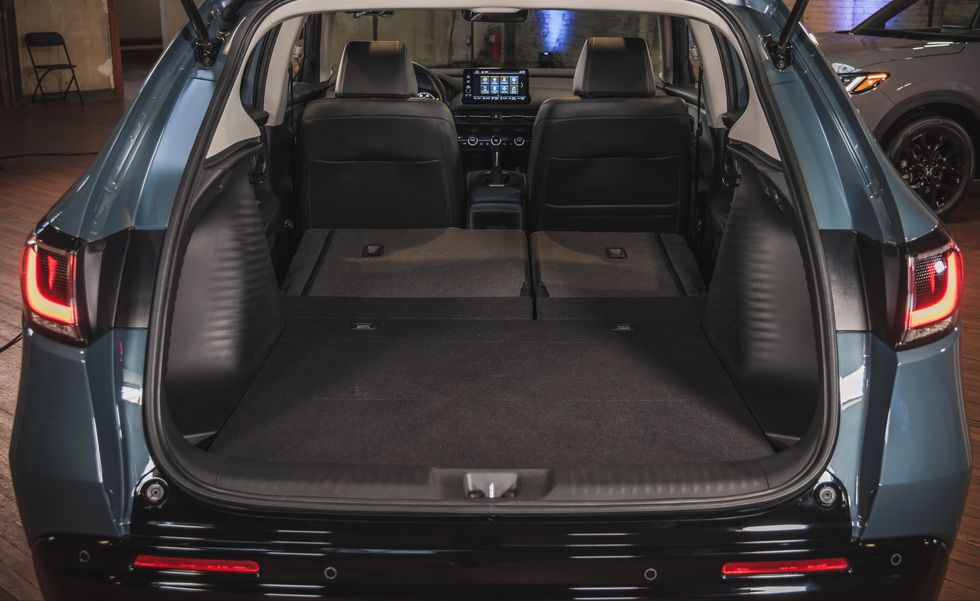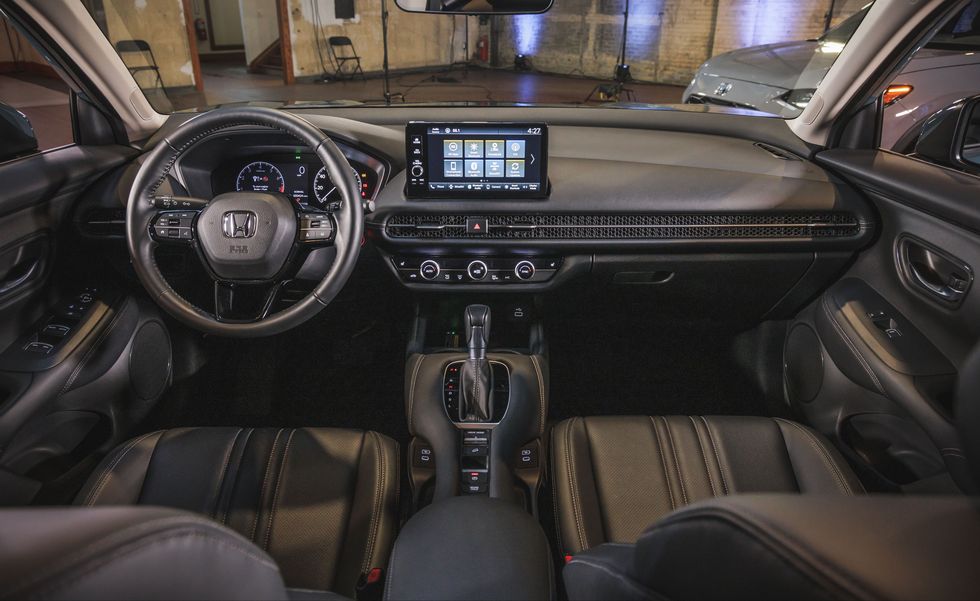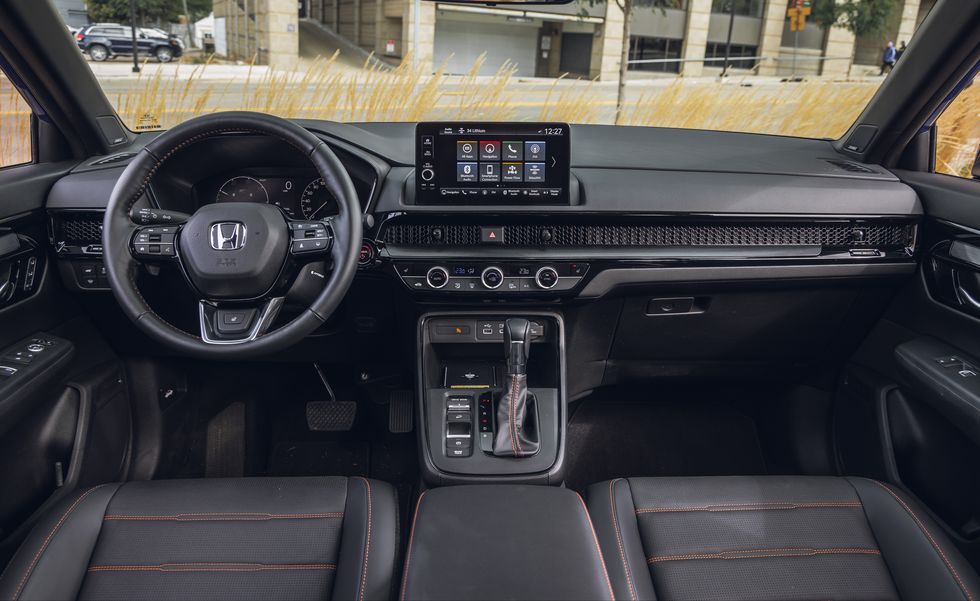Honda HR-V vs. Honda CR-V: Examining the Key Differences

If you’re in the market for a small SUV, there are two choices within Honda’s lineup: the compact CR-V and the subcompact HR-V. The CR-V is a popular and familiar choice that has been around since the 1990s, but the smaller HR-V is a newer addition to the lineup that’s only in its second generation in the U.S. To decide which of these Honda crossovers is right for you, we’ve outlined are some important things to know about each of them. They make look similar and offer many of the same features, but there are key differences between the two in terms of size, engines, performance, and price.
Exterior and Interior Size
The CR-V is the bigger of the two SUVs, but it’s not as much larger than the HR-V as it used to be. The second-generation HR-V, which was new for the 2023 model year, has grown in size. Still, the CR-V measures five inches longer, 1.1 inches wider, and 3.1 inches taller than the HR-V
This means more space inside, too. In terms of passenger volume, the CR-V beats the HR-V by seven cubic feet and offers more legroom for rear-seat passengers. There’s a lot more cargo space in the CR-V, too, with 39 cubic feet behind the rear seats and 77 cubic feet if you fold the rear seats. The HR-V has 25 cubic feet behind the rear seats and 55 cubic feet with the rear seats folded. In our real-world testing, that’s the difference between the CR-V fitting 11 carryon suitcases behind the rear seat and the HR-V fitting seven suitcases behind the rear seat.
Honda CR-V cargo space
Andi Hedrick|Car and Driver
Honda HR-V cargo space
Michael Simari|Car and Driver
Engines and Fuel Economy
The HR-V comes with only one engine choice, while the CR-V offers either a conventional gasoline engine or a hybrid option with improved fuel economy. Both SUVs come standard with a continuously variable automatic transmission. Front-wheel drive is standard across the board, and all-wheel drive is optional on both models on every trim level except for the CR-V Sport Touring, which has standard AWD.
We Review the CR-V and HR-V
The HR-V’s sole engine is a 2.0-liter inline-four with 158 horsepower. It’s somewhat sluggish to accelerate, achieving a lackluster 60 mph time of 9.4 seconds in our testing. We much prefer the CR-V’s standard engine, a turbocharged 1.5-liter inline-four with 190 horsepower. It’s a quicker than the HR-V, with a 60 mph acceleration time of 8.3 seconds in our testing.
The CR-V’s optional hybrid powertrain might be the best pick of the litter. It comes standard on the CR-V’s higher trim levels (Sport and Sport Touring) and is both more powerful and more fuel efficient than the standard gasoline engine. We measured its 60 mph acceleration at 7.9 seconds, and the EPA rates it at up to 40 mpg combined. That’s significantly better than both the gas CR-V, rated at up to 30 mpg combined, and the HR-V, rated at up to 28 mpg combined.
Technology and Features
The CR-V offers a few optional goodies not available on the HR-V, but both SUVs are well-equipped even in base form and offer plenty of convenience features. The HR-V offers only three trim levels—LX, Sport, and EX-L—while the CR-V lineup is broader and includes LX, EX, EX-L, Sport, and Sport Touring trim levels.
The base HR-V LX comes standard with features including:
17-inch wheels7.0-inch touchscreen with Apple CarPlay and Android AutoHonda Sensing driver-assist featuresAutomatic climate controlPushbutton start
Honda HR-V interior
Michael Simari|Car and Driver
Options available on the Sport and EX-L trim levels include:
Heated front seatsLeather upholsteryPower driver’s seat9.0-inch screen with Apple CarPlay and Android AutoSunroofRemote start
The base CR-V LX comes standard with features including:
17-inch wheels7.0-inch touchscreen with Apple CarPlay and Android AutoHonda Sensing driver-assist featuresAutomatic climate controlPushbutton start
Honda CR-V interior
Michael Simari|Car and Driver
Options available on the EX-L, Sport and Sport Touring trim levels include:
Heated front seatsHeated steering wheelLeather upholsteryPower driver’s and passenger’s seats9.0-inch screen with Apple CarPlay and Android AutoWireless phone chargerSunroofBuilt-in navigation
Price
As you’d expect given its greater size and performance, the CR-V is the more expensive of the two. The 2023 CR-V LX starts at $29,705, or $4310 more than the cheapest 2024 HR-V, which is $25,395. But there is some overlap in the price range, as the HR-V’s higher trim levels can exceed $30,000. The EX-L model with the $1500 AWD option, for instance, costs $30,445.
If you want a CR-V hybrid, that starts at $33,695 for the Sport trim level. The Sport Touring hybrid is the most expensive of the lot, starting at $40,395. You’ll have to decide for yourself if the CR-V’s extra interior space, additional features and available hybrid powertrain are worth the cost premium over the smaller HR-V.



